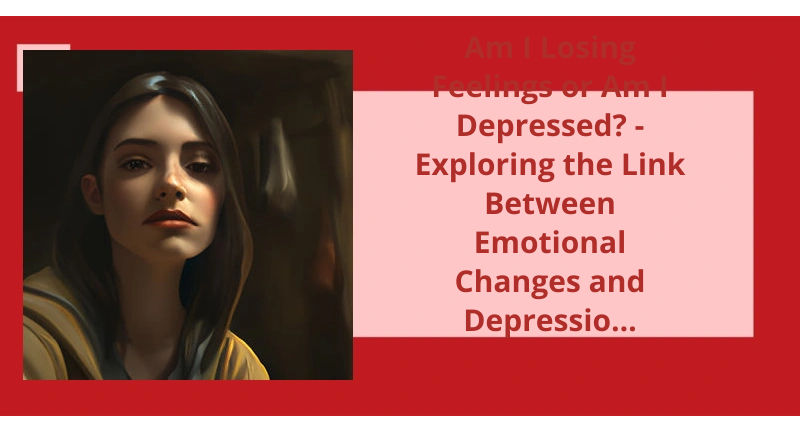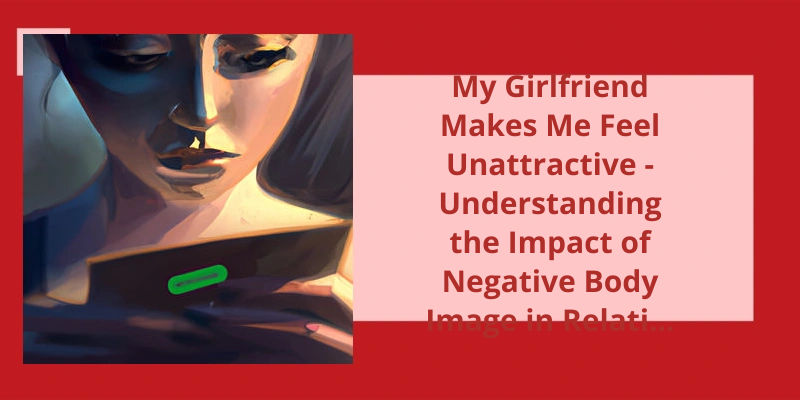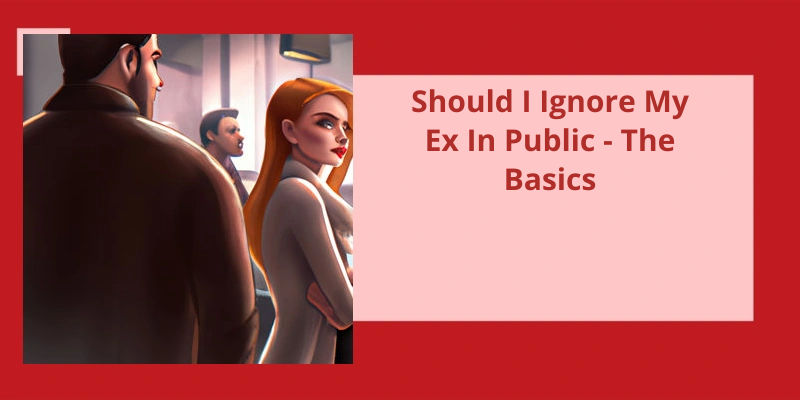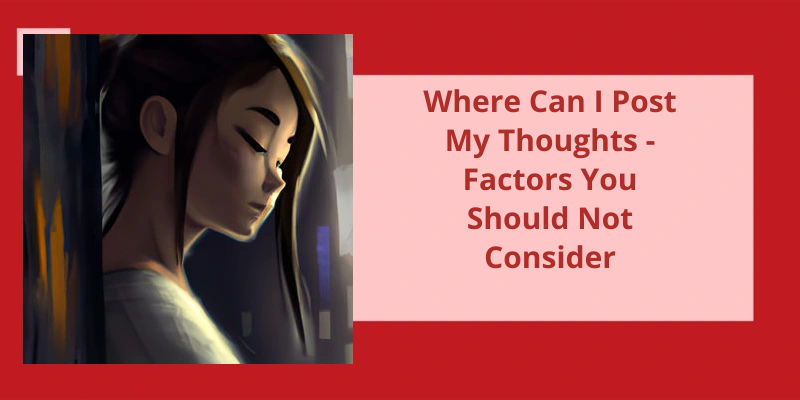It’s perfectly normal to experience changes in mood and emotions throughout our lives. However, when these changes result in a persistent feeling of loss of interest or enjoyment in activities that were once pleasurable, it can be difficult to determine whether this is a sign of losing feelings or a symptom of depression. Depression is a complex illness that can manifest in many different ways, and it’s important to seek professional help to fully understand the root cause. Whether it be through therapy or medication, finding the appropriate treatment can help individuals regain their emotional well-being and lead a fulfilling life. Understanding our emotions can be a daunting task, but it’s the first step towards finding a solution to any emotional struggle we may be facing.
Why Do I Suddenly Feel Nothing for My Boyfriend?
If youre experiencing symptoms of depression, it’s important to seek help from a mental health professional. They can help you to manage your symptoms, and to develop coping strategies for the times when you feel overwhelmed.
Another potential cause of feelings of emptiness in a relationship is boredom. If you and your partner have fallen into a routine, and if your relationship lacks spontaneity and excitement, you may find that you feel numb or disconnected. It can be helpful to try new things together, to inject some variety into your relationship, and to take risks that push you both outside of your comfort zones.
If youre feeling emotionally disconnected from your partner, it may also be a sign that you need more support in other areas of your life. For example, you may be feeling overwhelmed or stressed out at work, or you may be dealing with family or financial problems. If youre not addressing these other issues, your emotional reserves may be depleted, making it harder for you to connect with your partner on a deep level.
Ultimately, it’s important to remember that relationships are complex and multifaceted. It’s normal to experience ups and downs, and to go through periods of emotional numbness or disconnection. If youre feeling nothing for your boyfriend, it’s important to take the time to evaluate your feelings, and to seek out the support and guidance you need to move forward in a healthy and fulfilling way.
It’s important to recognize that mental health problems can manifest in a variety of ways. One common symptom is feeling emotionless, which can be indicative of conditions like depression, anxiety, and post-traumatic stress disorder. These are serious issues that require professional attention, rather than something to be ignored or normalized. Seeking help is essential for finding the support and resources necessary to improve one’s mental well-being.
Does Depression Mean Emotionless?
Depression can be a debilitating condition that affects many aspects of a persons life. It’s a mood disorder that can cause intense feelings of sadness, hopelessness, and worthlessness. However, some people with depression may experience a lack of emotion or feeling emotionless. This can be a confusing symptom and often leads to questions about whether depression means emotionless.
It’s important to note that depression isn’t a one-size-fits-all diagnosis. Everyone experiences depression differently, and some symptoms may be more prevalent than others.
Feeling emotionless can also be a symptom of other mental health problems. Anxiety, for example, can often lead to a sense of detachment from emotions, making it difficult to feel joy or excitement. Additionally, post-traumatic stress disorder (PTSD) can also cause a lack of emotion as a way of coping with traumatic experiences. In these cases, seeking professional help is crucial to accurately diagnose and treat these disorders.
It’s also essential to recognize the stigma surrounding mental health and seeking help. Many people are hesitant to talk about their emotions because of the way society views mental illness. However, depression and other mental health problems aren’t a sign of weakness or a personal failing. They’re legitimate medical conditions that require treatment, just like any other illness.
Ultimately, if you or someone you know are experiencing symptoms of depression or mental health problems, seeking help is essential. Emotional detachment or feeling emotionless isn’t something to dismiss or downplay. It’s essential to recognize the importance of mental health and to seek help from a licensed professional for proper diagnosis and treatment. With proper care, many people can recover from depression and other mental health problems and regain their emotional capacity.
Depression is a serious illness that can have a significant impact on your overall well-being. It can cause significant changes in your mood, thoughts, and behavior, making it difficult to engage in everyday activities. If left untreated, it can also lead to serious emotional and physical health problems. So, it’s essential to recognize the signs and symptoms of depression and seek treatment as soon as possible.
Can Depression Make You Feel Different?
Depression is a serious mental health condition that can significantly impact ones quality of life. People who suffer from depression may experience a range of symptoms that affect their mood, thoughts, and behavior. These symptoms can include feelings of sadness, hopelessness, and helplessness, as well as loss of interest in activities, difficulty sleeping, lack of energy, and changes in appetite.
One of the most challenging aspects of depression is the way it can make you feel different from your usual self. Depression can alter your perception of yourself and your surroundings, causing you to see things in a more negative light. This can lead to feelings of isolation, loneliness, and disconnection from others. People with depression often struggle to find motivation or enjoyment in things that once brought them pleasure, which can further exacerbate their symptoms.
Depression can also affect the way you think, making it difficult to concentrate or make decisions. You may find yourself dwelling on negative thoughts or worrying excessively about the future. These cognitive changes can lead to feelings of confusion and frustration, and may prevent you from taking action to address your depression.
Despite it’s debilitating effects, depression is a treatable condition. A combination of medication, therapy, and lifestyle changes can help to alleviate symptoms and improve overall wellbeing. Seeking help from a mental health professional is an important step towards recovery, and can provide the support and guidance needed to overcome depression and regain a sense of control over your life.
Depression is a complex condition that affects millions of people around the world. While the symptoms of depression can manifest in different ways, there’s one common thread that ties them all together: a pervasive sense of feeling helpless and hopeless. This can lead to a range of challenges, including difficulty maintaining relationships. In particular, anhedonia, the inability to feel pleasure or interest in anything, can make it seem like relationships are no longer fulfilling. In the following sections, we will explore this issue in more detail and offer suggestions for how to address it.
Can Depression Make You Lose Interest in Relationships?
When depression strikes, individuals may find themselves experiencing a range of emotions that they can’t control. Anhedonia may also kick in, which refers to the difficulty in feeling pleasure or interest in anything. This may be particularly concerning in personal relationships, as depression can greatly impact the way one perceives themselves, their partner, and their relationship. As a result, depression has been known to cause some individuals to lose interest in their relationships, making it a challenging and complex issue.
While depression affects individuals differently, it isn’t uncommon for depression to lead an individual to experience feelings of hopelessness, worthlessness and fatigue. In fact, these same feelings of inadequacy and underachievement can result in depressed individuals shutting themselves out from the world around them, including loved ones. This further exacerbates the loss of interest, making it difficult for the individual to build and sustain meaningful relationships.
As a result, activities that once brought enjoyment and pleasure may no longer be appealing or hold the same value. This includes spending time with loved ones, pursuing hobbies, or engaging in day-to-day activities. This emotional indifference may translate into personal relationships, prompting depressed individuals to lose interest or feel detached from their partners.
During bouts of depression, it’s common for individuals to view the world around them through a negative lens. Negative self-talk and overthinking can influence the way intimate partners are viewed, making it more difficult for the individual to remain emotionally invested in the relationship. These thoughts can lead to feelings of guilt, shame, and self-judgement, furthering the individuals desire to disengage from their relationships.
The lack of interest caused by depression can have harmful effects on a relationship if left unchecked. It can cause emotional distance and damage the bonds that hold partners together. Therefore, seeking treatment for depression, including therapy and medication, can be a lifesaver for individuals struggling to maintain romantic relationships. Not only will these treatments help alleviate depressions grip on an individuals life, but they may also help individuals understand their feelings of disinterest and rediscover the value of their personal relationships.
How to Support a Partner With Depression Who Has Lost Interest in the Relationship
- Listen actively and empathetically to your partner’s feelings.
- Encourage your partner to seek professional help from a therapist or doctor.
- Don’t take your partner’s lack of interest personally.
- Offer practical support such as taking care of household tasks or cooking meals.
- Try to maintain some level of normalcy in the relationship by engaging in activities you both enjoy.
- Be patient and understanding, as recovery from depression can take time.
- Take care of yourself and seek support as well if needed.
Understanding why we’re feeling unloved is an important step towards solving the issue. Whether it’s due to internal struggles or external factors, it’s essential to identify the root cause and work towards a solution. In the following section, we’ll discuss different aspects that could be contributing to our feeling of being unloved and ways to address them.
Why Do I Not Feel Loved Sometimes?
Prolonged loneliness and feeling unloved may lead to depression, anxiety, and other mental health issues. It’s not uncommon for individuals who’ve experienced trauma or abuse to struggle with feeling loved and valued. These issues don’t necessarily mean that youre not a lovable person, but rather that you need to work on healing and building your self-esteem.
If your relationship is causing you to feel unimportant or unloved, it’s important to talk to your partner about your feelings. A lot of times, we assume that our partners know how we feel and what we need to feel loved. However, thats not always the case. Communication is key, and by expressing our wants and needs, we can work together to build a stronger relationship. Sometimes, though, no matter how hard we try, a relationship may not be salvageable. It’s important to recognize when it’s time to move on from unhealthy relationships, even if it’s difficult.
Another reason why we may feel unloved is due to high expectations. We may set our expectations too high for our partners, and when they don’t meet them, it can lead to feelings of disappointment and being unloved. It’s important to have realistic expectations and to remember that our partners arent perfect.
Ultimately, feeling loved and valued starts with ourselves. We need to work on building our self-esteem and self-worth. This can come from something as simple as practicing self-care to more significant steps like seeking therapy or support groups. We need to remember that we’re worthy of love and that it’s okay to ask for what we need in a relationship.
The Impact of Social Media on Feelings of Loneliness and Disconnection
- Social media can increase feelings of loneliness and disconnection
- Comparing oneself to others on social media can lead to feelings of inadequacy
- Excessive use of social media may replace face-to-face social interaction, leading to feelings of isolation
- Research has shown a correlation between social media use and increased risk of depression and anxiety
- Being mindful of one’s social media use and taking breaks can be helpful in combating feelings of loneliness and disconnection
Conclusion
In conclusion, it’s important to acknowledge that losing feelings and experiencing depression can often feel similar, yet they’re two distinct emotional states. Recognizing the difference and seeking professional help can make a profound difference in one's mental and emotional health. It’s essential to prioritize self-care and take the necessary steps towards healing and achieving emotional wellness. Only by being attentive to our own emotional states can we maintain healthy relationships, achieve personal growth, and lead a fulfilling life.






